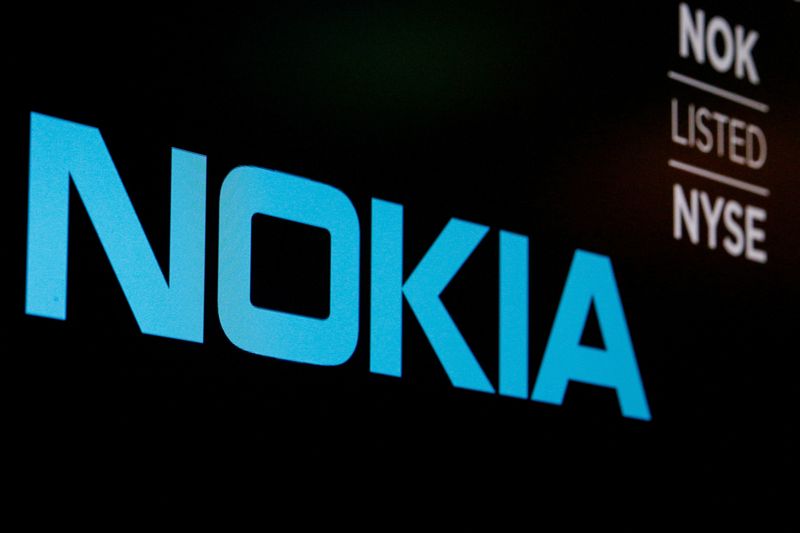Nokia, Ericsson slump as patent fights hit margins
2022.10.20 04:49
[ad_1]
2/2

© Reuters. FILE PHOTO: The logo and ticker for Nokia are displayed on a screen on the floor of the New York Stock Exchange (NYSE) in New York, U.S., May 21, 2018. REUTERS/Brendan McDermid/File Photo
2/2
By Supantha Mukherjee and Stine Jacobsen
STOCKHOLM/COPENHAGEN (Reuters) – Telecom equipment makers Nokia (NYSE:) and Ericsson (BS:) were among the worst performers in Europe on Thursday, bruised by ongoing patent battles which cut profit margins and offset strong demand for 5G equipment.
While the revenue of both companies beat expectations thanks to the rollout of 5G, delayed royalty payments meant their core profit missed analysts’ expectations.
Shares in Ericsson slumped 12% and were the worst performers in the while Nokia shares fell almost 5% to be among the worst.
As the early stages of a rollout of large projects like 5G tend to have lower margins, telecom companies depend on their high-margin patent royalty business to boost profits. Companies such as Ericsson charge $2.50 to $5 for every 5G handset they sell and come under pressure when negotiating new contracts.
Ericsson’s quarterly royalty revenue fell 1.1 billion Swedish crowns ($98.24 million) as it battled companies such as Apple (NASDAQ:) over patents. Nokia’s patent revenue was down by 62 million euros ($60.67 million), mainly due to a dispute with Oppo and Vivo.
Nokia’s gross margin fell to 40.1% from 40.7%, a tad better than Ericsson’s fall to 41.4% from 44%.
“We are very confident about our portfolio of patents and we are in no rush to strike a deal … we are going to make sure we get a good mutually beneficial deal,” Ericsson CFO Carl Mellander said in an interview.
However, when an agreement is reached, all the pending royalties are paid in a lump sum.
While the companies continue to benefit from higher spending on 5G equipment, they both warned of cooling down of their main market, North America.
“The North American market has grown very fast this year and it’s prudent to expect some kind of normalization of the market,” Nokia Chief Executive Pekka Lundmark said in an interview.
“But it’s too early to give detailed estimates because the operators have not yet announced their capex plans for next year,” he said.
The companies are expecting other countries, such as India to be a major driver for growth in 2023.
India’s Bharti Airtel and Reliance Jio launched 5G services in the world’s second most populous country earlier this month and has picked Nokia and Ericsson as equipment suppliers.
Analysts at Jefferies said the decline of high-margin markets like the U.S. and growth of low-margin markets like India would increase margin pressures in 2023.
Both companies have been trying to cut costs by spending on research amid chip shortages and supply chain disruptions due to the Russia-Ukraine war and chip shortages.
They plan to exit Russia by the end of the year.
Apart from the broad challenges, Ericsson has also been facing investigations over bribery in Iraq and investor ire over improper disclosure.
The company is being investigated by the U.S. Department of Justice (DOJ) and Securities and Exchange Commission (SEC) over its past conduct in Iraq. It had said it was engaging with both agencies and the outcome could not be assessed yet.
($1 = 11.1970 Swedish crowns)
($1 = 1.0219 euros)
[ad_2]
Source link








